
Eastern Orthodoxy in Turkmenistan is a major proportion of Christianity in Turkmenistan. Turkmenistan has a Muslim majority. The Eastern Orthodox Christians are about 5% of the population. [1]

Eastern Orthodoxy in Turkmenistan is a major proportion of Christianity in Turkmenistan. Turkmenistan has a Muslim majority. The Eastern Orthodox Christians are about 5% of the population. [1]
The Russian Orthodox Church in Turkmenistan is under the jurisdiction of the Russian Orthodox Bishop of Pyatigorsk and Cherkessiya. [2] There are 12 Russian Orthodox Churches in Turkmenistan, including four in Ashgabat, two in Türkmenabat, and one each in Balkanabat, Baýramaly, Daşoguz, Mary, Tejen, and Turkmenbashy. [3] The senior Russian Orthodox priest in Turkmenistan is based in Ashgabat. [3]

The Armenian Apostolic Church has no functioning churches in Turkmenistan. The former Armenian church in Turkmenbashy, built in 1903, is closed and in need of renovation. [4] The Armenian Embassy in Ashgabat and the Armenian Office of Diaspora Affairs operate Sunday schools in Ashgabat, Mary, and Turkmenbashy. [5]

The economy of Turkmenistan continues to recover from the 2014 downturn in hydrocarbon prices, but remains "in the grip of its worst economic crisis since the immediate post-independence period, driven in part by low gas prices, the suspension of gas exports to Russia between 2016 and 2019...and poor harvests." Former President Gurbanguly Berdimuhamedow at a session of the Cabinet of Ministers on March 11, 2021, called the rate of GDP growth unsatisfactory. When discussing the 2021 government budget, he noted that 2021 would be "as difficult" a year as 2020 had been.
Transport in Turkmenistan includes roadways, railways, airways, seaways, and waterways, as well as oil-, gas-, and water pipelines. Road-, rail-, and waterway transport fall under the jurisdiction of the Ministry of Industry and Communications.

Ashgabat or Asgabat, formerly named Poltoratsk between 1919 and 1927, is the capital and the largest city of Turkmenistan. It lies between the Karakum Desert and the Kopetdag mountain range in Central Asia, near the Iran-Turkmenistan border. The city has a population of 1,030,063.

Turkmenistan is a country in Central Asia bordered by Kazakhstan to the northwest, Uzbekistan to the north, east and northeast, Afghanistan to the southeast, Iran to the south and southwest and the Caspian Sea to the west. Ashgabat is the capital and largest city. It is one of the six independent Turkic states. With a population of 6.5 million, Turkmenistan is the 35th most-populous country in Asia and has the lowest population of the Central Asian republics while being one of the most sparsely populated nations on the Asian continent.
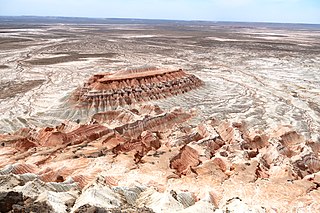
Balkan Region is the westernmost of the five regions of Turkmenistan. Clockwise from north it borders Kazakhstan, Uzbekistan (north); two provinces of Turkmenistan (east), Iran (south), and the Caspian Sea (west). The capital city is Balkanabat, formerly known as Nebit Dag. The region's boundaries are identical to those of the former Krasnovodsk Oblast', a Soviet-era province of the Turkmen Soviet Socialist Republic. This oblast was liquidated and restored repeatedly in the 20th century, concluding with its abolition in 1988. However, the administrative boundaries of the region were restored in 1991 when Balkan Region was established.
OJSC Turkmenistan Airlines is the flag carrier and only airline of Turkmenistan, headquartered in Ashgabat. It operates domestic and international passenger and cargo services mainly from its hub at Ashgabat International Airport.

Türkmenbaşy, formerly known as Krasnovodsk, Kyzyl-Su, and Shagadam, is a city in Balkan Province in western Turkmenistan, on the Türkmenbaşy Gulf of the Caspian Sea. It sits at an elevation of 27 metres. The population was 86,800, mostly ethnic Turkmens but also Russian, Armenian and Azeri minorities. As the terminus of the Trans-Caspian Railway and site of a major seaport on the Caspian, it is an important transportation center. The city is also the site of Turkmenistan's largest oil refining complex.
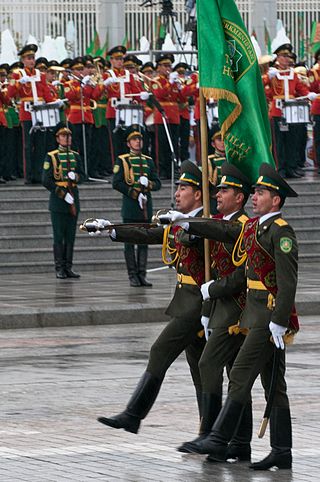
The Ministry for National Security or MNS is the secret police agency for the government of Turkmenistan. It is composed largely of the remnants of KGB organs left over after the collapse of the Soviet Union; its functions remain largely the same as well. The MNB and the national police force are under the direction of the Ministry of Internal Affairs. Until 2002, it was known as the KNB.

Christianity in Azerbaijan is a minority religion. Christians who estimated between 280,000 and 450,000 (3.1%–4.8%) are mostly Russian and Georgian Orthodox. There is also a small Protestant Christian community which mostly came from Muslim backgrounds. Due to the very hostile relations between Azerbaijan and Armenia, Armenian Christians have practically entirely fled the country, and so the Christians in Azerbaijan are members of various other groups, mostly Russians.

The districts of Turkmenistan are territorial entities below the provinces of Turkmenistan. They may be counties, cities, or boroughs of cities. The heads of the districts are appointed by the President of Turkmenistan.
The Turkmen of Turkmenistan, are predominantly Muslims. According the U.S. Department of State's International Religious Freedom Report for 2022,
According to U.S. government estimates, the country is 89 percent Muslim, 9 percent Eastern Orthodox, and 2 percent other. There are small communities of Jehovah's Witnesses, Shia Muslims, Baha’is, Roman Catholics, the International Society for Krishna Consciousness, and evangelical Christians, including Baptists and Pentecostals. Most ethnic Russians and Armenians identify as Orthodox Christian and generally are members of the Russian Orthodox Church or Armenian Apostolic Church. Some ethnic Russians and Armenians are also members of smaller Protestant groups. There are small pockets of Shia Muslims, consisting largely of ethnic Iranians, Azeris, and Kurds, some located in Ashgabat, with others along the border with Iran and in the western city of Turkmenbashy.

Bilateral diplomatic relations exist between Armenia and Turkmenistan. Armenia has an embassy in Ashgabat. Turkmenistan has an embassy in Yerevan.
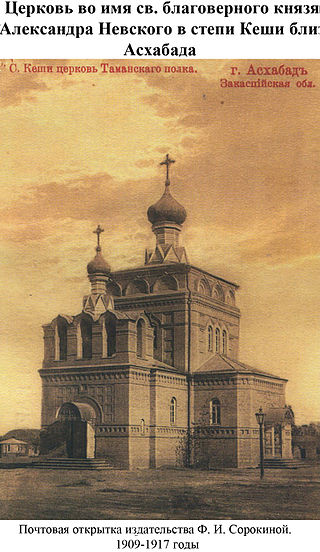
The St. Alexander Nevsky Church is a Russian Orthodox church in the city of Ashgabat, Turkmenistan. It is directed by Archpriest Ioann Kopach.

Independence Square is a square in Ashgabat, Turkmenistan. The identification number of the square is 2000.
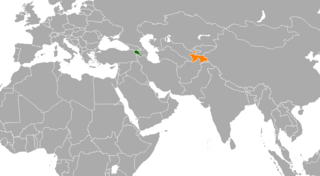
Bilateral diplomatic relations exist between Armenia and Tajikistan. The two countries are in a number of international and regional organizations, such as the United Nations, the Commonwealth of Independent States, the Collective Security Treaty Organization, and the Eurasian Economic Union. Armenia is represented in Tajikistan through its embassy in Ashgabat, Turkmenistan and has an honorary consulate in Dushanbe. Tajikistan is represented in Armenia through its embassy in Moscow, Russia. There is a small community of Armenians in Tajikistan, with many of the original population having left the country following the collapse of the Soviet Union and the following civil war in Tajikistan.
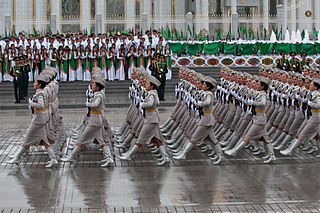
The Armed Forces of Turkmenistan currently funds 2 high ranking educational institutions: The Military Academy of Turkmenistan and the Military Institute of the Ministry of Defense of Turkmenistan. Aside from those two schools, there are several military schools around the country, specializing in the training of personnel of a branches of service. In the early 1990s when the armed forces were rapidly being developed, many officers were trained in the Russian Federation's Ministry of Defense, while at least 300 officers were sent to schools in Turkey. On 3 October 1992, the Turkmen State University created the first Turkmen educational department. This article lists institutions of the Turkmen Armed Forces based on its respective agency and service branch.
Turkmenistan is the only remaining sovereign country in the world that has not reported any cases of COVID-19. There were no confirmed cases of COVID-19 in Turkmenistan, with the totalitarian government being proactive in censoring relevant information. It is however suspected to have spread in the country unreported; specifics are difficult to ascertain and confirm in absence of independent media.
Pravoslavie.ru is a Russian Orthodox information Internet portal. It was created on 29 December 1999 by the editors of Sretensky Monastery's Internet projects. It is run by the blessing of Patriarch Alexy II of Moscow of the Russian Orthodox Church.

"Orthodoxy or death!" is a political slogan used by Russian nationalists and Eastern Orthodox fundamentalists. Since 2010 it has been recognised as part of the Federal List of Extremist Materials and banned in Russia.